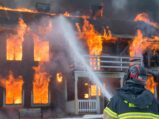(1) The cause having the most significant impact in bringing about the loss under a first-party property insurance policy, when two or more independent perils operate at the same time (i.e., concurrently) to produce a loss. Courts employ a set of proximate cause rules to resolve causation disputes when a property policy states that it covers or excludes losses "caused by" a peril and there is more than one peril at work in a fact pattern. Under common law, whether the policy provides coverage depends on which peril is chosen as the proximate cause. If the peril selected as the proximate cause is covered, courts consider the loss to have been caused by the covered peril and will hold that the loss is covered. If the peril selected as the proximate cause is uncovered or excluded, courts consider the loss to have been caused by the uncovered or excluded peril and will hold that the loss is not covered. (2) As a principle of tort law, proximate cause refers to a doctrine by which a plaintiff must prove that the defendant's actions set in motion a relatively short chain of events that could have reasonably been anticipated to lead to the plaintiff's damages. If the defendant's actions were "proximate" or close enough in the chain of causation to have foreseeably led to the plaintiff's damages, courts will impose liability. Otherwise, if the defendant's actions set in motion a long, bizarre chain of events that could not have reasonably been foreseen to lead to the plaintiff's damages, courts will not impose liability. In tort law, multiple actions by one or more defendants that are a substantial factor in producing the loss can qualify as proximate causes.
Definition provided by the International Risk Management Institute (IRMI) Glossary of Insurance.




